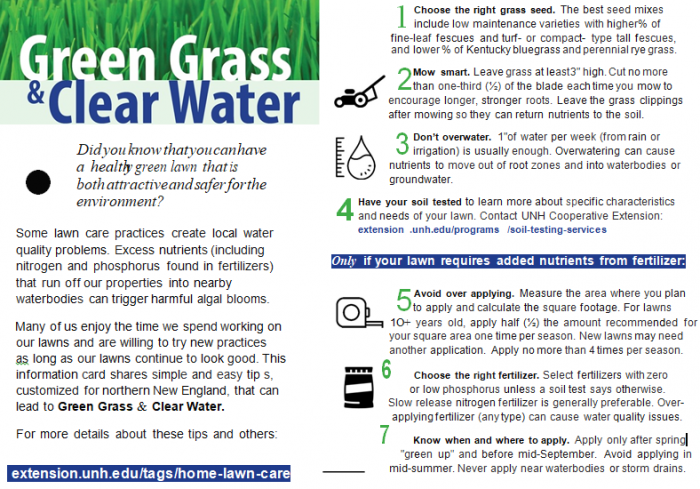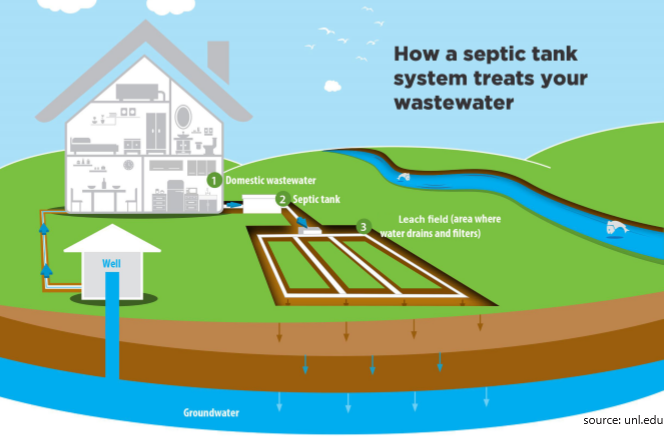Residents
Stormwater Information for Milford Residents
Milford residents are a crucial part of keeping our waterways and water resources healthy and clean. To find out how you can do your part in preventing stormwater pollution, read NHDES "New Hampshire Homeowner’s Guide to Stormwater Management - Do-It-Yourself Stormwater Solutions For Your Home" guide and the helpful tips below.
Pet Waste
Pet waste can be a significant source of water pollution. When pet waste is not properly disposed, it can be carried by rain or snow runoff directly into nearby waterbodies or into storm drains. Storm drains in streets and neighborhoods usually flow directly to a stream, river, or estuary without any treatment. Untreated animal fecal matter and wastes can become a source of harmful bacteria and nutrients in water. Just as we don’t want human sewage in our water, it is important to prevent pet waste from being carried into our waterways because of negligence. To learn more about pet waste’s impact on our stormwater system, read this brochure about Pet Waste and Water Quality (TBD).
Here are some easy steps for dealing with your pet's waste:
- Always carry a plastic bag when you walk your dog
- Re-using an old newspaper delivery bag or plastic grocery bag works well
- To avoid unpleasant surprises, check the bag for holes before your pet’s walk
- Use the bag as a glove to pick up the pet waste
- Turn the bag inside out around the waste, scoop it up, seal the bag, and dispose of it in a trashcan
- Don't place bagged or un-bagged pet waste in a storm drain or hose pet waste towards storm drains as they drain directly to a stream, river, lake or other water body
- If you have a large yard, bury un-bagged pet waste about 5 inches deep in the ground away from vegetable gardens and waterways; remember that compost piles may not get hot enough to kill disease-causing organisms
- Remove waste from areas where children play or you garden
- Wash your hands with warm, soapy water after dealing with pet waste
Check out this video on pet waste from Milford Girl Scout Troop 12027
Do Your Part: Scoop the Poop!
Scooping your pooch’s poop isn’t just a courtesy for those walking behind you; it’s the healthy and environmentally sound thing to do. Protect your outdoor playgrounds for yourself, your pooch, and your community by visiting the "Every Drop, Small changes. Big Difference" website and taking the Poop Patrol Pledge.
Lawn Care and Fertilizer
Some lawn care practices create local water quality problems. Excess nutrients (including nitrogen and phosphorus found in fertilizers) that run off our properties into nearby waterbodies can trigger harmful algal blooms. It's possible to have a healthy, green lawn that is both attractive and safer for the environment. Many of us enjoy the time we spend working on our lawns and are willing to try new practices as long as our lawns continue to look good.
Some helpful tips:

- Use pesticides and fertilizers sparingly. When use is necessary, use these chemicals in the recommended amounts. Avoid application if the forecast calls for rain; otherwise, chemicals will be washed into your local stream.
- Select native plants and grasses that are drought- and pestresistant. Native plants require less water, fertilizer, and pesticides.
- Sweep up yard debris, rather than hosing down areas. Compost or recycle yard waste when possible.
- Don't overwater your lawn. Water during the cool times of the day, and don't let water run off into the storm drain.
- Cover piles of dirt and mulch being used in landscaping projects to prevent these pollutants from blowing or washing off your yard and into local waterbodies. Vegetate bare spots in your yard to prevent soil erosion.
For more information about lawn care, click the "Green Grass & Clear Water" brochure and/or visit UNH Cooperative Extension's Home Lawn Care page.The materials on this page share simple and easy home lawn care tips, customized for northern New England, that can lead to Green Grass & Clear Water.
Septic Maintenance
If you are connected to a septic system, it is important to ensure that the system is in working order to prevent pollution to local waterways. If a septic system fails, untreated wastewater can run off into local lakes, ponds or streams, negatively impacting water quality, wildlife and community enjoyment of the water body. Pumping, inspecting and maintaining your septic system will help keep your septic system functioning properly and head off catastrophic failure, ensuring your money doesn’t go down the drain too.

For more information on how to care for your septic system, visit the following regarding the installation, use, and maintenance of septic systems.
- Get Pumped! New Hampshire
- NH DES Flyer
- NH DES Environmental Fact Sheet - You and Your Septic System A Homeowner’s Guide to Septic System Maintenance
- NH DES What's Flushable Brochure
- EPA's Septic Smart Website
Pollution Prevention Tips & Tools
Check out the following websites for more information regarding stormwater pollution prevention:

